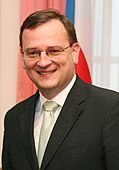Czech regional elections, 2012
|
|
|||||||||||||||||||||||||||||||||
|---|---|---|---|---|---|---|---|---|---|---|---|---|---|---|---|---|---|---|---|---|---|---|---|---|---|---|---|---|---|---|---|---|---|
|
|||||||||||||||||||||||||||||||||
|
675 |
|||||||||||||||||||||||||||||||||
| Turnout | 36.89% | ||||||||||||||||||||||||||||||||
|
|||||||||||||||||||||||||||||||||
|
|||||||||||||||||||||||||||||||||
Elections to regional councils in the Czech Republic were held in 13 regions (except Prague) on 12–13 October 2012. The Czech Social Democratic Party won in 9 regions, though it suffered a considerable loss of votes. The Communist Party of Bohemia and Moravia won elections in two regions and increased the number of votes received, placing second overall. The Civic Democratic Party is widely seen as having been defeated; it finished third overall and won only in the Plzeň region. The regional grouping Mayors for the Liberec Region surprisingly won the election in its region.
The Czech Social Democratic Party won 2008 election in all regions. Though it lost significant support in the months before election, the party was leading in polls, as parties of right-wing government were highly unpopular. People have been losing confidence in established parties over the long-term and have been turning to non-parliamentary parties. A growing part of population seemed to be leaning to the Communist Party of Bohemia and Moravia, which had been isolated in Czech politics since the Velvet Revolution.
The Czech Social Democratic Party won the 2008 election in the region with 33.80% of the vote and formed a coalition with the ODS.
Czech Social Democratic Party won 2008 election in region with 34.84% of votes and formed coalition with ODS.
...
Wikipedia



